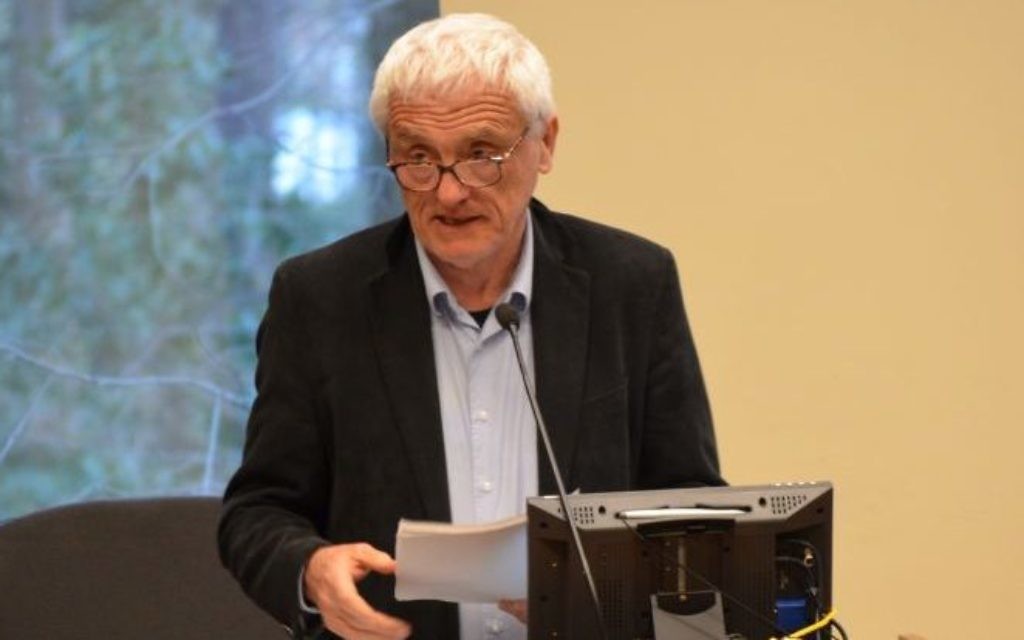Polish Atrocities in Holocaust Echo Across Decades
Professor Jan Gross details the evidence that Poles killed more Jews than Germans under occupation.

Poles under occupation in World War II killed more Jews than they killed Germans, Jan Gross told an audience at Emory University.
The number of Jews killed by Poles in Poland was a small fraction of the total killed by Nazis, but the plunder and killing of Jews by their neighbors were not insignificant.
The perpetrators were sometimes Polish peasants, members of guerrilla organizations, or people who held roles in the local officialdom, such as village heads or employees of district offices, said Gross, quoting historians’ papers with witness testimonies.
Get The AJT Newsletter by email and never miss our top stories Free Sign Up
The killings were sanctioned, Gross said, meaning that regular members of the community took part and that they were done openly and publicly, drawing crowds of onlookers.
Gross, an emeritus history professor at Princeton, expanded on the Polish targeting of Jews in a lecture Tuesday, March 27, to the Tam Institute for Jewish Studies called “In the Aftermath of Neighbors: Were the Killings of Jews by Polish Peasants a Norm or an Exception?”
Without exception, the perpetrators were Roman Catholics, Gross said, and there were observers for almost every crime.
The crimes, he said, were committed against victims who were often known by name to their attackers.
He added the villagers were in solidarity with the accused and there was no need to expiate for the crime.
Most villagers felt solidarity with the culprits, Gross said. Again citing historians’ papers, he said Polish villagers either lacked interest in the fate of Jews and or felt disapproval toward them.
A special category was given to Polish police functionaries, who exercised a sense of superiority and freedom from German authority, Gross said. Because there was no blueprint on how to operate during a genocidal occupation, everything was fluid, he said.
“In every aspect of the killing process and every stage of the Holocaust, decisions had to be made,” Gross said. “It is a phenomenon filled with individual decisions from perpetrators who were not coerced but … pushed the process along, based on their own initiatives.”
This process became clear, Gross said, after people realized that the Germans were going to lose the war.
The simple motive for Poles to murder Jews was the opportunity to plunder their belongings, Gross said, quoting a fellow historian.
“We can safely assume that local people viewed the right to private property as the norm, and the only occasion which they felt it might be suspected … was to relieve extreme hardships which would befall themselves, such as a fire or a flood,” Gross said.
The view of acceptable behavior against Jews shifted during the occupation. In the eyes of their Polish neighbors, Gross said, Jews ceased to be human beings. “The plunder of Jews was a social practice rather than a criminal or deviant behavior of some individuals.”
After the war, Gross said, it was impossible for Polish Jews to return to their homes because many Catholic Poles saw a Jewish return as an invasion rather than a restoration and were willing to defend their seized property by any means.
Polish President Andrzej Duda signed a bill in February that makes it illegal to accuse the nation or its citizens of complicity in crimes committed by Nazi Germany. Since then, Gross said, Jewish museums in Poland have been hijacked and have begun trying to construct their own stories of the past.
“Poles’ involvement in these crimes was opportunistic,” Gross said. “Many across the European continent benefited from the Nazi policies stripping Jews of property rights and eliminating them from public life or stripping the Jews of lives altogether.”




comments